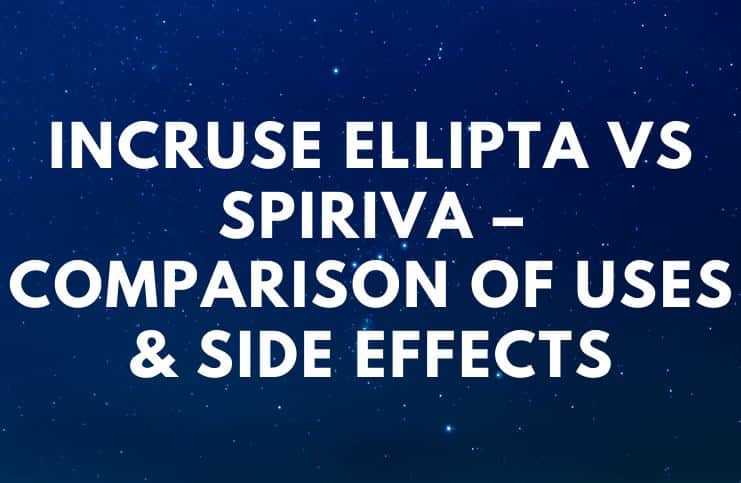Incruse Ellipta vs Spiriva – Comparison of Uses & Side Effects:
Incruse Ellipta
It is the brand name of a drug called umeclidinium, which belongs to a group of drugs called anticholinergic agents.
Mechanism of Action
It works by relaxing and opening airways in the lungs.
Uses
This prescription medication is used for long-term control of symptoms of chronic obstructive pulmonary disease, an ongoing lung disorder that makes it hard to breathe.
According to the American Lung Association, over 11 million people in the United States have been diagnosed with COPD.
The main cause of this chronic obstructive pulmonary disease is smoking. Also, long-term exposure to chemical irritants can also lead to the condition.
The most common signs of chronic obstructive pulmonary disease:
- tightness in the chest;
- a cough that doesn’t go away;
- wheezing;
- shortness of breath, particularly when you are physically active;
- coughing up lots of mucus.
Dosage
The usual recommended dose is 1 inhalation a day.
Note – use this anticholinergic agent at the same time each day, and not more than once in a 24-hour period.
Side Effects and Precautions
Common side effects may include:
- tooth pain;
- sneezing;
- joint pain;
- sinus pain
- altered sense of taste;
- mouth pain;
- stuffy nose;
- stomach pain;
- bruising or skin discoloration;
- a sore throat.
Rare side effects may include:
- painful urination;
- choking;
- little or no urinating;
- rapid heartbeats;
- seeing halos around lights;
- eye pain;
- wheezing;
- tunnel vision;
- blurred vision.
Contraindications
Before taking this anticholinergic agent, tell your healthcare provider if you have:
- bladder obstruction;
- narrow-angle glaucoma;
- enlarged prostate;
- heart disease.
Alcohol
Avoid drinking alcoholic beverages while taking this medication since alcohol use can substantially increase the risk of side effects.
Drug Interactions
It may negatively interact with other medications, especially:
- bladder drugs, such as – darifenacin, solifenacin, or tolterodine;
- atropine (used to help reduce secretions in airways during surgery);
- bronchodilators, including – ipratropium, aclidinium, or tiotropium;
- medicine to treat stomach ulcers or excess stomach acid;
- drugs to treat Parkinson’s disease;
- allergy medications that contain an antihistamine.
Pregnancy & Breastfeeding
It is not known whether this anticholinergic agent passes into breast milk or if it could affect the nursing infant.
It is not known whether this anticholinergic agent will harm a developing fetus. Tell your healthcare provider if you are pregnant before using this medication.
Spiriva
It is the brand name of a medication called tiotropium inhalation, which is part of a family of medications called bronchodilators.
Uses
This prescription medication is used to treat chronic obstructive pulmonary disease.
It is produced by Boehringer-Ingelheim and Pfizer. It was originally approved by the US Food and Drug Administration in 2004.
Mechanism of Action
This drug works by relaxing and opening the air passages to the lungs.
Contraindications
Before taking this bronchodilator, tell your healthcare provider if you have:
- kidney disease;
- if you also take medicine to treat an overactive bladder;
- enlarged prostate;
- if you are allergic to milk;
- narrow-angle glaucoma.
Dosage
The usual recommended dosage is 18 mcg once a day using the HandiHaler device.
Pregnancy & Breastfeeding
It is not known whether this bronchodilator can harm a developing fetus. Also, it is not known whether this bronchodilator can pass into breast milk or harm a breastfeeding infant.
Side Effects and Precautions
Common side effects may include:
- runny nose;
- upset stomach;
- constipation;
- dry mouth;
- sinus pain;
- chest pain;
- blurred vision;
- painful urination;
- sore throat.
Less common side effects may include:
- blurred vision;
- little or no urinating;
- eye pain or redness;
- white patches on your lips, mouth, or tongue;
- seeing halos around lights;
- burning when you urinate;
- wheezing.
Drug Interactions

- Benadryl (diphenhydramine);
- DuoNeb (albuterol/ipratropium);
- diclofenac;
- Combivent (albuterol/ipratropium);
- Atrovent (ipratropium);
- Iressa;
- Humalog.
Alcohol
Avoid drinking alcoholic beverages while taking this bronchodilator since alcohol use can substantially increase the risk of severe side effects.
Bottom Line – Incruse Ellipta vs Spiriva
Incruse Ellipta (active ingredient – umeclidinium) is an anticholinergic medication that is used to prevent airflow obstruction or bronchospasm in sufferers with chronic obstructive pulmonary disease.
It works by relaxing muscles in the airways to improve breathing. Incruse Ellipta is not a rescue medicine and it will not work fast enough to treat a bronchospasm attack.
Spiriva (active ingredient – tiotropium) is a medication that is prescribed for the treatment of chronic obstructive pulmonary disease. This medication is in a family of drugs known as bronchodilators.
According to a 2016 study, umeclidinium demonstrated superior efficacy to tiotropium on the primary endpoint of trough forced expiratory volume in 1 second at day 85. However, safety profiles were similar for both medications.
Regarding their price, the average retail price for 1 inhaler (30 blisters) of Incruse Ellipta 62.5mcg is $329, while the average retail price for 1 handihaler (30 capsules) of Spiriva 18mcg per capsule is $410.
READ THIS NEXT:
References https://www.ncbi.nlm.nih.gov/pubmed/23949963 https://www.ncbi.nlm.nih.gov/pubmed/27103795 https://www.ncbi.nlm.nih.gov/pubmed/29094315



Can you take spiriva and trelegy elliptical together